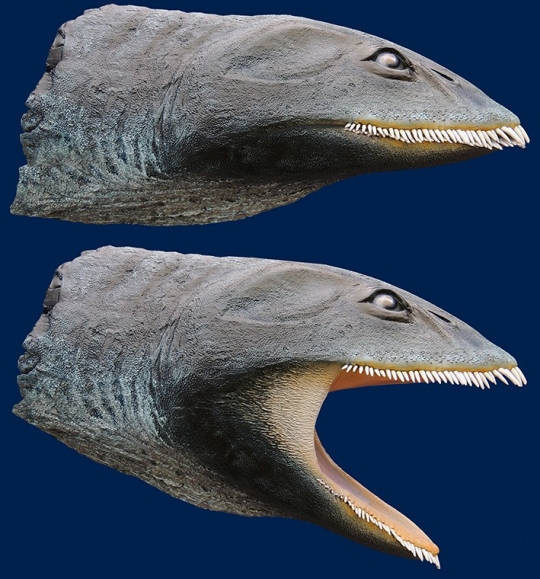 Life reconstruction of Morturneria, sculpted by co-author Dr. Stephen Godfrey currently on display at the Calvert Marine Museum.
Life reconstruction of Morturneria, sculpted by co-author Dr. Stephen Godfrey currently on display at the Calvert Marine Museum.SOLOMONS, Md. (Sept. 19, 2017)—Calvert Marine Museum's paleontologist, Dr. Stephen Godfrey, co-authored a just-released study in the Journal of Vertebrate Paleontology entitled "Cranial Anatomy of Morturneria seymourensis from Antarctica, and the Evolution of Filter Feeding in Plesiosaurs of the Austral Late Cretaceous". The lead author is Dr. Frank Robin O'Keefe, Ph.D., of Marshall University, West Virginia. Dr. Godfrey also created the reconstructed life-model of Morturneria under the direction of Dr. O'Keefe. The model is currently on display at the Calvert Marine Museum through December 2017.
Plesiosaurs are ocean-dwelling lizards from the age of dinosaurs, known for their four flippers, stout bodies, and long necks. However, until now all plesiosaurs were thought to be predators that ate fish, squid, and even other marine reptiles. This paper describes a plesiosaur with a large round head, a huge mouth, and tiny teeth in the lower jaw that point the wrong way. The teeth did not meet tip to tip as in all other plesiosaurs, but lie together in a battery that acted in straining food particles from the water. This feeding style is unknown in other marine reptiles, but is found in today's baleen whales.
The identification of whale-like filter feeding is a startling case of convergent evolution; plesiosaurs and whales shared many of the intervening steps in the evolution of this feeding style, and their extreme morphologies are similar despite arising from different ancestors. The evolution of filter feeding may be linked to changes in ocean circulation brought on by the southward movement of Antarctica during the Late Cretaceous.
This research is published by an international team of paleontologists from Chile, Argentina, and the United States led by F. Robin O'Keefe, Professor of Biology at Marshall University in Huntington, WV, USA. Dr. O'Keefe is a globally recognized scientist specializing in the study of Mesozoic marine reptiles, and in the interplay between evolution and the physical environment. For more information, contact Dr. Stephen Godfrey at 410-326-2042, ext. 28 or email Stephen.Godfrey@calvertcountymd.gov.

